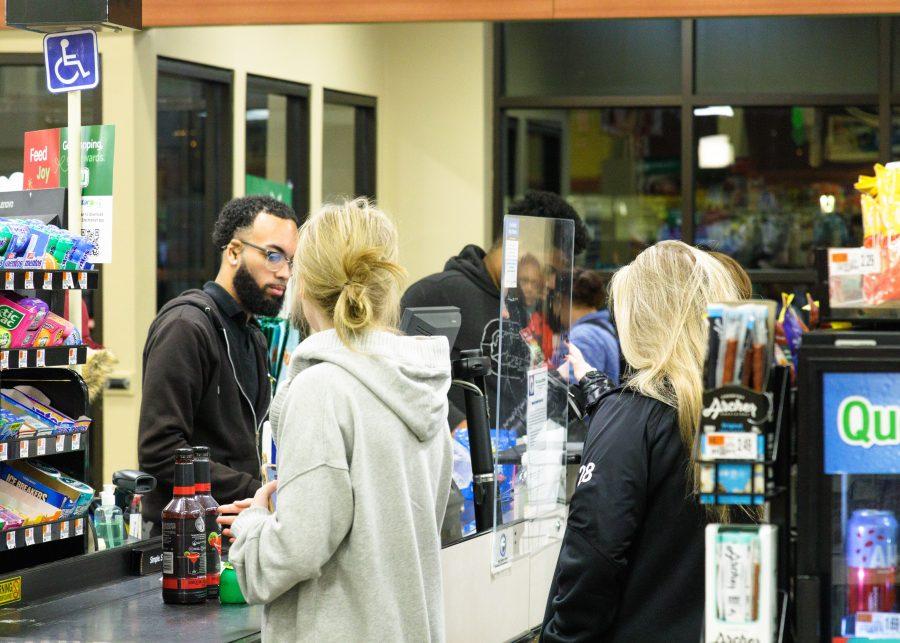Customers cash out at a grocery store.
I got my first job at 16. After the first day of my junior year of high school, my mom drove me to Michael’s Arts and Crafts to have my first job interview.
I sat down with the manager and hiring manager as I laid out the resume that my dad helped me put together for the first time. I ended up getting the job, and while it was only a seasonal position, I still felt accomplished.
My dad had been the one to push me to get a job. I preferred spending my afternoons hanging out with friends or watching TV, but after many persistent conversations, I finally caved. I had volunteered many times before with my high school youth group, but there was something special about working for my own money. After I left Michael’s, I went on to work several minimum wage jobs, until I found my current minimum wage job.
At the start of my minimum wage career, the money earned just went to Starbucks and Taylor Swift merchandise. While some of the money I make still goes toward that, my purchases eventually grew to bigger and more important things, like rent, bills and student loan payments. Minimum wage jobs do more than just pay $14.25 an hour. They are where I learned my people skills. I grew to love conversations with random people about random topics.
When I worked at a farm, I would share recipes with customers using various products. When I worked at a bookstore, I could share my opinions on books of every genre. Now, scooping ice cream, I share my recommendations of which flavor a customer would like based on their preferences.
I learned how to create conversations out of silence and how to connect with people. Before my minimum wage journey, I could barely speak to the people in my classes, let alone converse with a random stranger. I now feel comfortable in most social situations despite my previous ineptitude.
While on your own minimum wage journey, you meet others who are walking the same path. Most of the time, you have almost nothing in common except for the fact that you are both scheduled to work the same six-hour shift on a random Tuesday in October.
There is something special about the connections you make with these people who you likely would have never crossed paths with before. Maybe it’s the fact that you are all slowly losing your minds with the same repetitive and boring tasks, but something about it is fun.
Those people make the shifts a little less boring, whether it be the conversation you’re having with them or the strange playlist they decided to put on the speakers. Either way, it doesn’t really matter, because you’re stuck with them anyway.
Throughout my journey, I have learned how to manage my money. During my time at Michael’s, managing my money wasn’t high on my list of priorities. I didn’t have any payments that needed to be made, so I spent my paychecks on whatever my heart desired.
Now, with bills to pay and food to purchase, I have learned a few ways to manage the hundreds of dollars going into my bank account every month. Direct deposit has become my lifesaver. I automatically set it to put half my paycheck into savings to be used towards payments that need to be made.
Now, does the method work all the time? No, but it provides a little bit of structure that I need to start saving money. Managing finances is something that plays a huge role later in life, so it’s important to start early.
When the time comes to end a minimum wage job, you are still provided a great resume. Future employers are looking for people who know how to work, so it automatically puts you ahead of the crowd.
Minimum wage workers are the backbone of our society, and it’s important for everyone to understand what those work environments are like to really understand our world. If you haven’t started your minimum wage journey, I encourage you to find a job that suits you.


